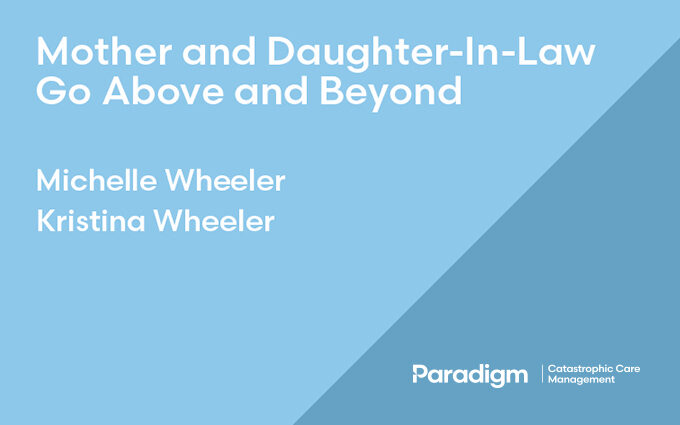10/16/2020

In the third part of our series, Paradigm continues to shine a light on our Network Managers, particularly a new generation of nurses who are now entering this special career path. For some of these younger case managers, the profession has turned out to be a family calling. Whether the relative is a parent, sibling, or in-law, the unique bond and the closeness they share can be a powerful draw.
Paradigm strives to build an inclusive and supportive work culture that is very often called a family by the people in it. This unity and camaraderie is key to helping seriously injured workers and their families improve their quality of life and return to their communities. No matter what kind of family it is, when it comes to our exceptional case managers, we’re thrilled to see them inspire the next generation and bring them into the fold.
Michelle Wheeler had been with Paradigm for more than two decades when her future daughter-in-law Kristina approached her about becoming a case manager. As she puts it, “My son started dating this young, self-motivated woman who wanted to become a nurse; and eventually she let me know that she wanted to do what I was doing.”
So Michelle recommended that Kristina find an entry-level case manager job first. “Kristina was very driven and she had critical care experience in the ICU, which are both the qualities that a Paradigm Network Manager needs,” Michelle continues. “But I said I simply didn’t have the time then to train from the very beginning with these types of cases.”
Driven to new challenges
After some searching, Kristina found an insurance company that hired beginning case managers. “I learned so much in those two years, especially how to interact with providers and payers and deal with the basic challenges in helping injured patients get back to normal activities,” shares Kristina. “What I really started to discover though was that I felt more driven when I did encounter serious cases. I definitely wanted to do more.”
During this time, Kristina also completed an accelerated bachelor of nursing degree as well as a case management certification. Says Kristina, “That’s when I came back to Michelle and said hey, I’m ready now.” While some people would have reservations about working with a mother- or daughter-in-law, Michelle believes their relationship was a benefit during the training period. “Initially, she practically lived with me, and that was the only way I knew how to do it,” Michelle recalls. “I wanted her to see what it was like living with these cases for a long period of time and having to meet with a catastrophically injured workers’ family as well as manage multiple stakeholders and providers. It’s such a huge part of the job and it’s the biggest challenge for many new case managers taking on catastrophic and complex injuries.”
Now, they each have their own cases, but they are still there to help each other out when needed for appointments or a medical records review. “The greatest thing is at any time I know I can text or call Michelle if I have a quick question and she’s very responsive,” says Kristina.
As many of the systems and operations have changed throughout the years— Michelle recounts writing and faxing 120-page reports by hand— she’s come to realize that knowledge passed between generations can be a two-way street. “Kristina was brought in under the newest systems and she is such a whiz. She’s honestly really helped me as I’ve adjusted to doing things differently.”
How the Paradigm Way works for these two network managers
Both nurses share a deep appreciation for the Paradigm model and its focus on functional outcomes. “Making a difference in a patient’s life versus just returning them to work is a totally different mindset,” explains Kristina. “But doing it successfully is even more inspiring.”
Michelle has seen a lot of changes in her years of case management, but she still loves the fulfillment that comes with truly making a difference. “I’ve loved being a Paradigm nurse ever since I started here. It is more difficult than the other case management work I did, but I was so awe-inspired by the amount of support I’ve received and the people who I get to help. I really feel like as a nurse we are empowered to do the right thing.”
For Kristina, both the case work and the culture at Paradigm have been a really good fit for her personality. She explains, “I love challenges. When I encounter obstacles to care, I’m someone who says, ‘I want to figure this out and problem-solve this.’” Another thing she loves and finds highly motivating is positive feedback, “I think the greatest thing I’ve learned about Paradigm and their process is that the team is great about always giving positive feedback, even for smaller tasks.”
What stands out for Michelle is how the Paradigm model of risk management really creates a positive feedback loop that benefits everyone involved. “They manage risk in a way that actually drives positive outcomes for patients and makes case managers feel rewarded,” she says. “When you do that, everyone wins, especially injured workers and their families.”
For two case managers with experience in multiple facets of the industry, they love working for a team that doesn’t just want to check off boxes and get people back on the job. As Kristina puts it, “It’s been refreshing to come to a company that actually focuses on function and making sure patients are able to return to their community and be independent. They see it too and it has a very positive effect when they believe you’re really there for them and willing to go above and beyond.”
Read more about the incredible work our network managers and case managers do for injured workers and their families every day.
#ParadigmCan #CMSACMWeek2020